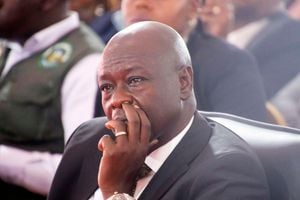MPs to have final say on President Ruto education reforms

National Assembly Education Committee Chair Julius Melly (centre) and other committee members address journalists in Nairobi on July 4. The committee will play a crucial role in the implementation of proposed changes to education.
Members of Parliament will decide the fate of many of the recommended changes to the education system that must be anchored in law.
The report of the Presidential Working Party on Education Reforms (PWPER) has indicated 14 amendments to the Basic Education Act for the changes to be lawful. In the implementation matrix, it gives different time frames but estimates that all of them will be concluded within 12 months.
Other Acts that require amendments are the Kenya Institute of Curriculum Development Act, Kenya Literature Bureau Act and Kenya National Examinations Act.
PWPER has also recommended the publishing of three new Bills—Teachers Education and Training Bill, Management of Scholarship and Bursaries in Education Bill and The Education Appeals Tribunal Bill.
During the launch of the report on Tuesday, President William Ruto asked the chairpersons of the Education committees in the National Assembly and the Senate, Julius Melly and Joe Nyutu, respectively, to fast track the matters when they go before the House.
“The evidence-based analyses of every material issue taken up in the report provide ample basis for further action, which must commence without delay,” the President said. He also directed the Attorney-General to support the Ministry of Education (MoE) in addressing legislative gaps.
“I make a special appeal to Parliament to expedite the enactment of necessary laws and appeal to all Kenyans and development partners to walk with us on this journey,” Dr Ruto said.
The majority of the changes will be to the Basic Education Act. The PWPER report recommends the repeal of the Early Childhood Education Act to transfer the provision on Early Childhood Development Education to the Basic Education Act. This will align with the definition of basic education as starting from pre-primary to senior school. Provision of ECDE is currently a devolved function.
“MoE, Council of Governors and Teachers Service Commission (TSC) to develop an intergovernmental agreement for hiring and remuneration of pre-primary teachers. This will ensure harmonisation of pay for all pre-primary teachers and that the TSC manages the payroll ... while the counties hire the pre-primary teachers,” the report reads.
There is also a proposal to amend Section 56 of the Basic Education Act to revise the composition of the boards of management of schools.
Senior school boards will have 10 members, including a national government representative. Stakeholders noted that the presence of an administrator was important to advise on security matters. Parents’ representation has been reduced as only the chairperson of the parents association will sit on the board.
The newly-created comprehensive school (pre-school, primary and junior school) will have 13-member boards. At this level, parents will have three representatives, one of whom shall be the chairperson.
The report wants Section 56A amended to create the positions of principal and a deputy principal of the comprehensive school. MPs will also be required to amend Regulation 79 (b) of the Basic Education Regulation to delete the classification of institutions as national, extra-county, county or sub-county.
The proposed new categorisation of schools will be day, boarding, mixed (day/boarding), mixed (boys/girls); and according to pathways the schools offer at senior secondary.
Parliament will also be required to delete Section 11 (c)(f) and Section 35(1) of the TSC Act regarding the quality assurance function. Changes will also be made to related provisions in the TSC regulations.
Section 35 (2) of the TSC Act will also be deleted alongside related regulations to make pre-service and in-service teacher training the responsibility of the MoE.
The proposed Education Appeal Tribunal Bill seeks to reform the Education Appeals Tribunal to hear all administrative issues in the education sector.
“This shall include appeals from the decision of the TSC Review Panel, appeals on examination from Kenya National Examinations Council decisions, appeals on decisions of the Council of Universities and appeals from the decisions of TVET Board of Governors or council,” the recommendation reads.
The proposed Teacher Education and Training Bill seeks to bring all teacher training colleges (TTCs) under a single entity called Kenya Teachers Training College (KTTC). The TTCs in the counties will convert to campuses of KTTC headed by a director.
The National Education Management Information System (Nemis) will also be changed to the Kenya Education Management Information System (Kemis).
The Management of Scholarship and Bursaries in Basic Education Bill will seek to centralise the management of bursaries and scholarships under the Kenya Basic Education Bursaries and Scholarships Council. It will have a central database to capture all bursaries and scholarships.
MPs will also be expected to amend the title of the Kenya National Examinations Council Act to change the council’s name from Kenya National Examination Council to Kenya National Assessment Council. This is meant to reflect the shift from examinations to assessments under the CBC.





